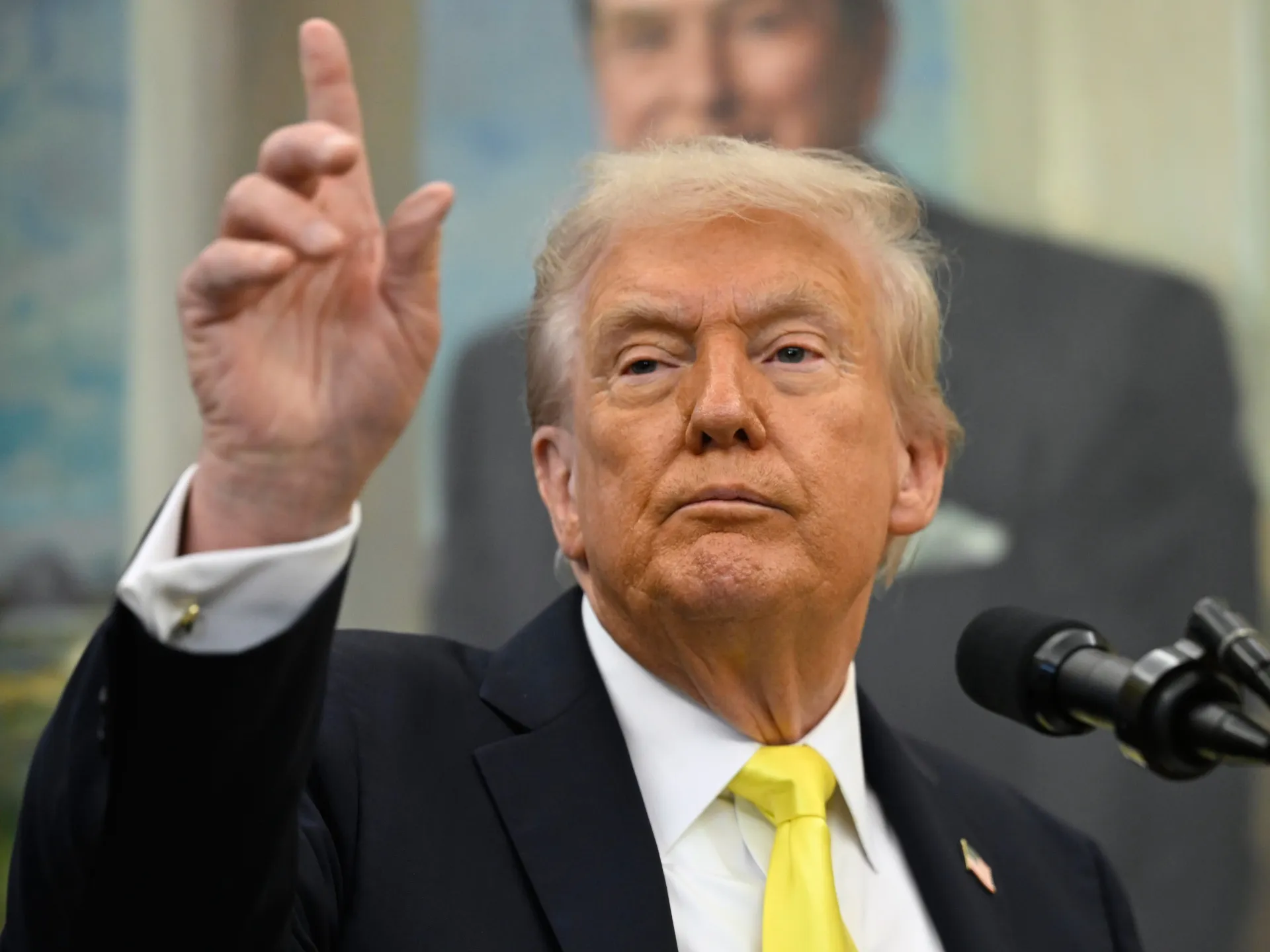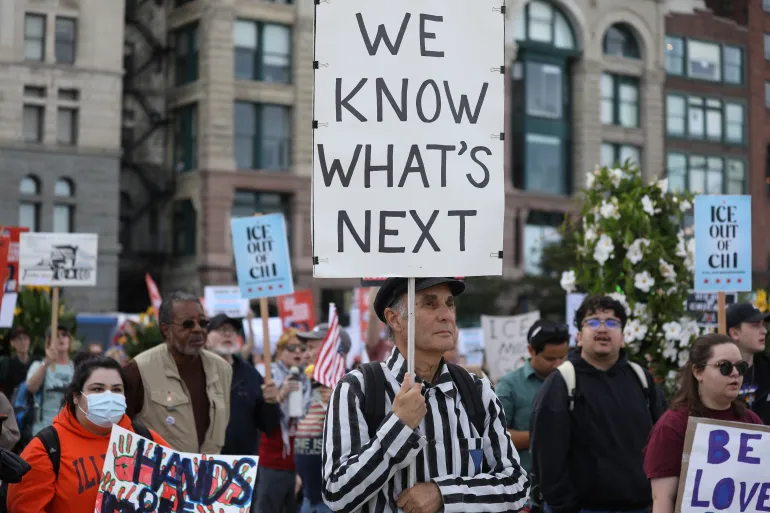Trump authorises CIA operations in Venezuela, says mulling land attack | Donald Trump News
United States President Donald Trump on Wednesday confirmed that he has authorised the Central Intelligence Agency (CIA) to carry out covert operations in Venezuela.
He added that his administration was also mulling land-based military operations inside Venezuela, as tensions between Washington and Caracas soar over multiple deadly US strikes on Venezuelan boats in the Caribbean Sea in recent weeks.
Recommended Stories
list of 3 itemsend of list
On Wednesday, Trump held a news conference with some of his top law enforcement officials, where he faced questions about an earlier news report in The New York Times about the CIA authorisation. One reporter asked directly, “Why did you authorise the CIA to go into Venezuela?”
“I authorised for two reasons, really,” Trump replied. “Number one, they have emptied their prisons into the United States of America.”
“The other thing,” he continued, was Venezuela’s role in drug-trafficking. He then appeared to imply that the US would take actions on foreign soil to prevent the flow of narcotics and other drugs.
“We have a lot of drugs coming in from Venezuela,” Trump said. “A lot of the Venezuelan drugs come in through the sea. So you get to see that. But we’re going to stop them by land also.”
Trump’s remarks mark the latest escalation in his campaign against Venezuela, whose leader, Nicolas Maduro, has long been a target for the US president, stretching back to Trump’s first term in office.
Already, both leaders have bolstered their military forces along the Caribbean Sea in a show of potential force.
The Venezuelan government hit back at Trump’s latest comments and the authorised CIA operations, accusing the US of violating international law and the UN Charter.
“The purpose of US actions is to create legitimacy for an operation to change the regime in Venezuela, with the ultimate goal of taking control of all the country’s resources,” the Maduro government said in a statement.
Earlier, at the news conference, reporters sought to confront Trump over whether he was trying to enforce regime change in Caracas.
“Does the CIA have authority to take out Maduro?” one journalist asked at the White House on Wednesday.
“Oh, I don’t want to answer a question like that. That’s a ridiculous question for me to be given,” Trump said, demurring. “Not really a ridiculous question, but wouldn’t it be a ridiculous question for me to answer?”
He then offered an addendum: “But I think Venezuela’s feeling heat.”
Claiming wartime powers
Trump’s responses, at times meandering, touched on his oft-repeated claims about Venezuela.
Since taking office for a second term, Trump has sought to assume wartime powers – using laws like the Alien Enemies Act of 1798 – by alleging that Venezuela had masterminded an “invasion” of migrants and criminal groups onto US soil.
He has offered little proof for his assertions, though, and his statements have been undercut by the assessments of his own intelligence community.
In May, for example, a declassified US report revealed that intelligence officials had found no evidence directly linking Maduro to criminal groups like Tren de Aragua, as Trump has alleged.
Still, on Wednesday, Trump revisited the baseless claim that Venezuela under Maduro had sent prisoners and people with mental health conditions to destabilise the US.
“Many countries have done it, but not like Venezuela. They were down and dirty,” Trump said.
The authorisation of CIA operations inside Venezuela is the latest indication that Trump has been signing secret proclamations to lay the groundwork for lethal action overseas, despite insisting in public that he seeks peace globally.
In August, for instance, anonymous sources told the US media that Trump had also signed an order allowing the US military to take action against drug-trafficking cartels and other Latin American criminal networks.
And in October, it emerged that Trump had sent a memo to the US Congress asserting that the country was in a “non-international armed conflict” with the cartels, whom he termed “unlawful combatants”.
Many such groups, including Tren de Aragua, have also been added to the US’s list of “foreign terrorist organisations”, though experts point out that the label alone does not provide a legal basis for military action.
Strikes in the Caribbean Sea
Nevertheless, the US under Trump has taken a series of escalatory military actions, including by conducting multiple missile strikes on small vessels off the Venezuelan coast.
At least five known air strikes have been conducted on boats since September 2, killing 27 people.
The most recent attack was announced on Tuesday in a social media post: A video Trump shared showed a boat floating in the water, before a missile set it alight. Six people were reportedly killed in that bombing.
Many legal experts and former military officials have said that the strikes appear to be a clear violation of international law. Drug traffickers have not traditionally met the definition of armed combatants in a war. And the US government has so far not presented any public evidence to back its claims that the boats were indeed carrying narcotics headed for America.
But Trump has justified the strikes by saying they will save American lives lost to drug addiction.
He has maintained the people on board the targeted boats were “narco-terrorists” headed to the US.
On Wednesday, he again brushed aside a question about the lack of evidence. He also defended himself against concerns that the bombings amount to extrajudicial killings.
“When they’re loaded up with drugs, they’re fair game,” Trump told reporters, adding there was “fentanyl dust all over the boat after those bombs go off”.
He added, “We know we have much information about each boat that goes. Deep, strong information.”
Framing the bombing campaign in the Caribbean as a success, Trump then explained his administration might start to pivot its strategy.
“ We’ve almost totally stopped it by sea. Now, we’ll stop it by land,” he said of the alleged drug trafficking. He joked that even fishermen had decided to stay off the waters.
“ We are certainly looking at land now because we’ve got the sea very well under control.”




